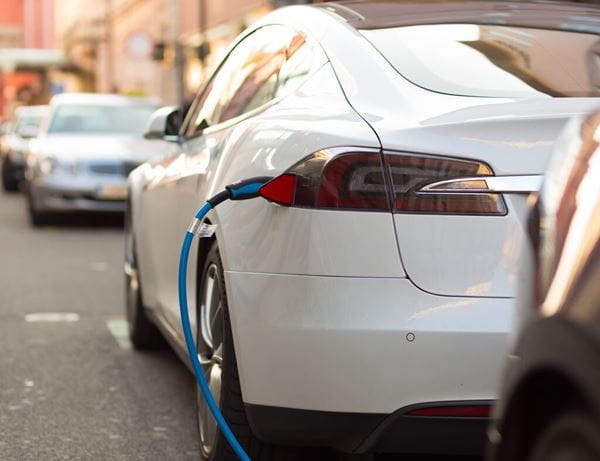
Energy Price Cap Impact on EV Drivers
How will the October energy price cap affect EV drivers?
Many electric vehicle drivers will face overnight increases in charging costs from 1 October 2022 – but are they still cheaper to run than petrol or diesel?
Ofgem has today confirmed the latest energy price cap, which comes into force from 1 October 2022. The adjustment means the average annual household energy bill will be £3,549, an 80.1% increase [1], and affects the cost of charging an electric car at home. Here’s what you need to know.
What is the energy price cap?
Energy price caps were introduced in January 2019 by government regulator Ofgem and are designed to ensure fair pricing for gas and electricity. Rates are adjusted to reflect wholesale energy prices, limiting what utility companies can charge for household bills while also enabling them to pass on ‘reasonable’ operating costs and stay in business [2].
Ofgem had published price caps every six months but, starting from October, the rates will be adjusted quarterly to reflect fluctuating wholesale costs and reduce the risk of utility companies folding [3]. The headline figure indicates annual bills for a typical UK household, with separate rates depending how they pay for their energy.
Both rates have more than tripled since October 2020:
Period | Default tariff (Direct Debit) | Pre-payment (Meter) |
From 01/10/2020 | £1,042 | £1,070 |
From 01/04/2021 | £1,138 | £1,156 |
From 01/10/2021 | £1,277 | £1,309 |
From 01/04/2022 | £1,971 | £2,017 |
From 01/10/2022 | £3,549 | £3,608 |
Source: Ofgem [4]
Households on fixed-rate energy contracts are not affected by the price cap, but this is becoming less common. Fluctuating energy prices have made utility companies less willing to offer new fixed- rate contracts where customers’ previous tariffs have ended, or if they have moved because their previous supplier has folded.
Ofgem estimates 24 million customers will be affected in October 2022 [5] compared to 15 million a year previously [6]
Why are energy costs rising?
Global demand for gas surged as economies recovered after Covid-19 and supply has struggled to keep up, causing a once-in-a-generation spike in wholesale prices.
In February, Ofgem said prices peaked at eight times higher than the seasonal norm last winter and were expected to be well above average through the summer [7]. This also affects electricity prices, as almost half (37.9%) of the UK’s supply comes from gas power plants [8].
Six-month price cap adjustments hadn’t responded quickly enough to enable utility companies to cover those costs. Wholesale energy prices were around 7.4p/kWh when Ofgem announced the previous price cap in August 2021. By December this had peaked 24.1p/kWh [9], of which a maximum 21p/kWh could be charged back to consumers [10].
Administrative costs from the resulting collapse of 31 utility companies since January 2021 [11] are passed on to households as a higher ‘standing charge’ on their energy bill [12].
It’s also worth noting that the April 2022 price cap was announced at the start of February, before the invasion of Ukraine and subsequent embargoes on Russian gas, which has constrained the global supply even further. The effects of the ongoing conflict are reflected in the October 2022 rates.
How will the October price cap affect electricity bills?
The new rates come into effect from 1st October 2022:
- Electricity costs per unit will be capped at 52p/kWh (kilowatt-hour), up from 28p/kWh since 1st April (+85.7%)
- Standing charges, which are a fixed daily rate regardless of usage, will be limited at 46p, instead of 45p under the old rates (+2.2%)
For context, the UK-wide average cost of electricity in 2021 was 18.5p/kWh [13].
How will rising energy prices affect electric vehicle drivers?
Electric vehicle drivers will already have noticed the cost of public chargepoints has increased, as the businesses operating them are not protected by the price cap. The RAC’s Charge Watch initiative reported almost a 50% price rise for fastest chargepoints between September 2021 and May 2022 [14] and there have been further increases since.
Changes to the price cap (specifically the unit cost, as this reflects usage) will lead to charging costs almost doubling overnight for households on a default tariff. For a typical mid-size electric vehicle (averaging 3.5 miles per kilowatt-hour) covering 10,000 miles per year, the price cap would add £57.14 to a driver’s monthly charging costs.
Company car drivers on a default tariff are also likely to find the HMRC-approved Advisory Electric Rate of 5p per mile also won’t cover their charging costs, as shown by the following examples:
Vehicle | Cost per mile April 2022 Price Cap (28p/kWh) | Cost per mile Oct 2022 Price Cap (52p/kWh) |
Fiat 500 Icon | 6p | 12p |
Renault Zoe R135 GT-Line | 8p | 15p |
Kia Niro EV | 7p | 14p |
Volkswagen ID3 Life Pro | 7p | 13p |
Mercedes-Benz EQC 400 4Matic | 10p | 19p |
How do electricity costs compare to a petrol or diesel car?
Electricity costs are rising much faster than fossil fuels, and this is eroding the traditional running cost advantages of an electric car.
The October price cap will mean ‘fuel’ costs for an electric vehicle could reach parity with petrol, diesel and hybrid counterparts in some segments – even if they are charged at home – as shown in the following table.
Vehicle | Fuel | Cost per mile |
Fiat 500 Icon | Electric | 12p |
Fiat 500 Mild Hybrid Red | Petrol | 14p* |
Renault Zoe R135 GT-Line | Electric | 15p |
Renault Clio TCe 90 R.S. Line | Petrol | 16p* |
Kia Niro EV 3 | Electric | 14p |
Kia Niro Hybrid 3 | Hybrid | 14p* |
Volkswagen ID3 Life Pro | Electric | 13p |
Volkswagen Golf 2.0 TDI Life | Diesel | 14p* |
Mercedes-Benz EQC 400 4Matic | Electric | 19p |
Mercedes-Benz GLC 220d 4Matic | Diesel | 19p* |
(Based on The AA July 2022 Fuel Price Report UK average: 188.5p/litre petrol, 196.8p/litre diesel [15])
Prices are still volatile. As wholesale costs rise, consultancy firm Cornwall Insights is predicting average household energy bills will rise by another third once the next price cap comes into force in January [16].
Without government intervention, this could significantly affect running costs for fleets, and our consultants are working with customers to help build those changes into whole-life cost modelling.
Where can I find out more about fuel costs?
LeasePlan’s free online tool can show how much an electric vehicle will cost, including adjustable values to reflect your home energy tariff. To find out more, visit our EVCost Per Mile Calculator.
REFERENCES:
[1] Ofgem (2022). Ofgem updates price cap level and tightens up rules on suppliers [online]. Available at: https://www.ofgem.gov.uk/publications/ofgem-updates-price-cap-level-and-tightens-rules-suppliers. [Accessed 26 Aug 2022].
[2] Ofgem. (2022). Default tariff cap level: 1 April 2022 to 30 September 2022. [online] Available at: https://www.ofgem.gov.uk/publications/default-tariff-cap-level-1-april-2022-30-september-2022 [Accessed 26 Aug. 2022].
[3] Ofgem. (2022). Domestic Gas and Electricity (Tariff Cap) Act 2018 Modification of the standard conditions of all gas & electricity supply licences [online] Available at: https://www.ofgem.gov.uk/sites/default/files/2022-08/Price%20cap%20-%20Decision%20on%20changes%20to%20the%20wholesale%20methodology%20-%20040822%20Modification%20Notice.pdf [Accessed 26 Aug 2022].
[4] Ofgem. (2022). Default Tariff Cap. [online] Available at: https://www.ofgem.gov.uk/energy-policy-and-regulation/policy-and-regulatory-programmes/default-tariff-cap [Accessed 26 Aug 2022].
[5] Ofgem. (2022). Ofgem confirms changes to the price cap methodology and frequency ahead of new rate to be announced later this month. [online] Available at: https://www.ofgem.gov.uk/publications/ofgem-confirms-changes-price-cap-methodology-and-frequency-ahead-new-rate-be-announced-later-month [Accessed 26 Aug 2022].
[6] Ofgem. (2021). Record gas prices drive up price cap by £139 – customers encouraged to contact supplier for support and switch to better deal if possible. [online] Available at: https://www.ofgem.gov.uk/publications/record-gas-prices-drive-price-cap-ps139-customers-encouraged-contact-supplier-support-and-switch-better-deal-if-possible.
[7] Ofgem. (n.d.). Check if the energy price cap affects you. [online] Available at: https://www.ofgem.gov.uk/information-consumers/energy-advice-households/check-if-energy-price-cap-affects-you [Accessed 26 Aug. 2022].
[8] National Grid ESO. (2022). ESO Data Portal: Historic GB Generation Mix - Dataset. [online] Available at: https://data.nationalgrideso.com/carbon-intensity1/historic-generation-mix/r/historic_gb_generation_mix [Accessed 26 Aug. 2022].
[9] Ofgem. (2022). Wholesale market indicators. [online] Available at: https://www.ofgem.gov.uk/energy-data-and-research/data-portal/wholesale-market-indicators [Accessed 26 Aug. 2022].
[10] Ofgem. (2021). Default tariff cap level: 1 October 2021 to 31 March 2022. [online] Available at: https://www.ofgem.gov.uk/publications/default-tariff-cap-level-1-october-2021-31-march-2022 [Accessed 26 Aug. 2022].
[11] Ofgem. (n.d.). What happens if your energy supplier goes bust. [online] Available at: https://www.ofgem.gov.uk/information-consumers/energy-advice-households/what-happens-if-your-energy-supplier-goes-bust [Accessed 26 Aug. 2022].
[12] Ofgem. (2022). Open letter: Review of how the costs of supplier failure are recovered. [online] https://www.ofgem.gov.uk/sites/default/files/2022-07/Open%20letter%20Review%20of%20how%20the%20costs%20of%20supplier%20failure%20are%20recovered%20.pdf [Accessed 26 Aug. 2022].
[13] Department for Business, Energy & Industrial Strategy. (2022). Average unit costs and fixed costs for electricity for UK regions (QEP 2.2.4) [online] Available at: https://assets.publishing.service.gov.uk/government/uploads/system/uploads/attachment_data/file/1043383/table_224.xlsx [Accessed 26 Aug. 2022].
[14] RAC (2022). Electric car public charging costs | RAC Charge Watch. [online] Available at: https://www.rac.co.uk/drive/electric-cars/charging/electric-car-public-charging-costs-rac-charge-watch/ [Accessed 26 Aug. 2022].
[15] The AA. (2022). Fuel price report (July 2022). [online] Available at: https://www.theaa.com/~/media/the-aa/pdf/motoring-advice/fuel-reports/july-2022.pdf [Accessed 26 Aug. 2022].
[16] Cornwall Insights. (2022) Cornwall Insight release final predictions for October’s Price Cap [online] Available at: https://www.cornwall-insight.com/cornwall-insight-release-final-predictions-for-octobers-price-cap/ [Accesed 26. Aug. 2022].
[17] HMRC. (2022). Advisory fuel rates. [online] Available at: https://www.gov.uk/guidance/advisory-fuel-rates [Accessed 26 Aug. 2022].

.jpg?rev=3adbd558867c4d92bf9f22752f12a09c&mw=600)



